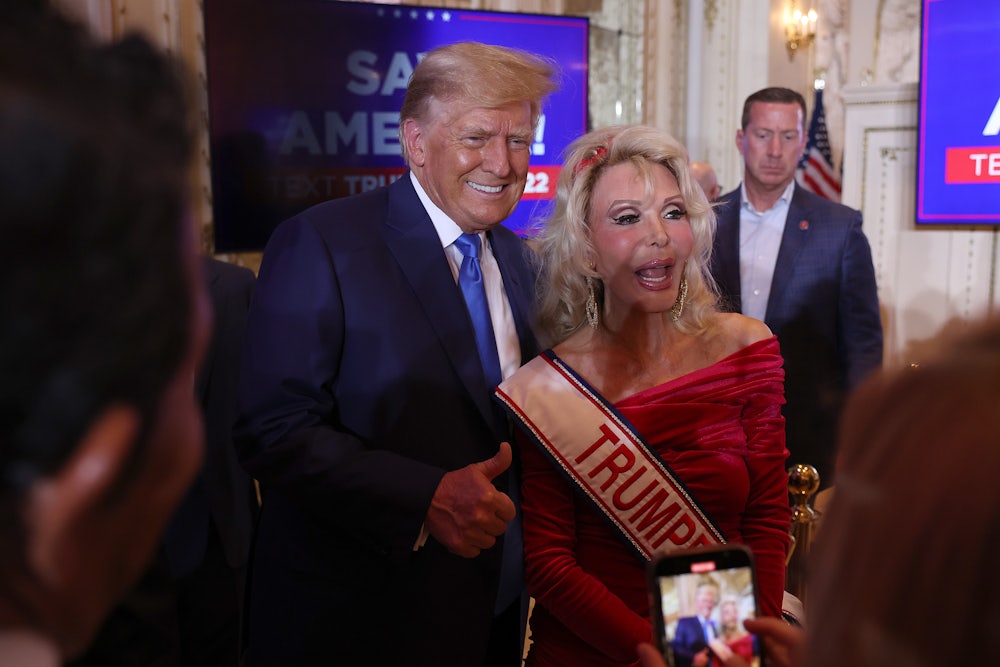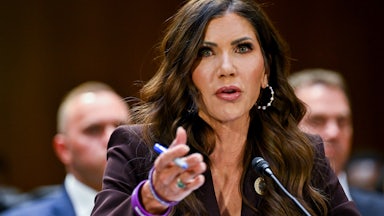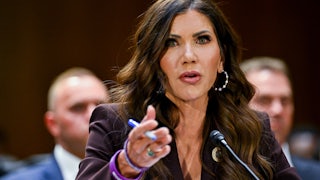As it became clear that the long-rumored red tsunami was anything but—try a red trickle—former President Donald Trump took the stage at Mar-a-Lago to insist that not only was it not his fault but that everything was going fine, actually.
After boasting about his record picking winners in the primary elections—during which Trump elevated many fringe candidates and also endorsed dozens who were running unopposed—Trump pivoted to the general election. “As of this moment—and we still have some out there—we are 80 wins and three losses. Is that good?” he asked, as the audience cheered. Around midnight, he posted, “So far tonight, 104 and 4. Great Republican Candidates!” Two hours later, the score changed once again: “174 wins and 9 losses,” he wrote. “A GREAT EVENING.” Wednesday he added that while the “election was somewhat disappointing, from my personal standpoint it was a big victory,” pegging his final record at 216 wins and 16 losses.
It certainly was not a great evening. Tuesday’s midterm elections were a fiasco for Donald Trump. They were also a debacle for Republicans—the latest proof that the party struggles whenever Trump tries to insert himself into electoral politics.
Trump’s highest-profile selections were disasters. In Pennsylvania, he backed the rabid election denier Doug Mastriano for governor and smarmy TV doctor Mehmet Oz for senator. Both were bad choices in a state that Joe Biden had narrowly won in 2020: Mastriano was far too radical and Oz both too inexperienced and too blatantly not from Pennsylvania. (He lived in New Jersey until very recently.) Mastriano got blown out by the state’s attorney general, Josh Shapiro. Oz moderated his campaign slightly after winning the primary, distancing himself somewhat from Trump’s election lies while building his campaign around taunting his opponent for having had a stroke. He lost as well, hurt in the end by a multitude of factors: a series of Lucille Bluth–like gaffes; appearing with Mastriano and Trump down the stretch; his own political inexperience; and, of course, his New Jersey roots.
Trump’s other Senate selections didn’t fare much better. The reformed globalist J.D. Vance romped to victory, but that was hardly a surprise in now reliably Republican Ohio. In Georgia, Trump’s handpicked candidate, the former football player and illegitimate-child enthusiast Herschel Walker is headed toward a runoff. In Arizona, the extremely Trumpy former newscaster Kari Lake is trailing—and is, of course, crying fraud. Trump’s gubernatorial candidates in Michigan and Wisconsin also lost winnable races by wider than expected margins.
You see the same story all across the country. In Ohio, Marcy Kaptur fought back a challenge from the Trump-endorsed J.R. Majewski. (That one wasn’t just on Trump: The House GOP pulled its support after it emerged that Majewski had lied about his military service.) In New Hampshire, Republicans faced a rout: Chris Pappas lost a winnable House race, as did the similarly Trump-backed Senate candidate, Don Bolduc. In Colorado, the Trump-Qanon acolyte Lauren Boebert is trailing in what was widely regarded as a reliably Republican district.
The victories that Trump can claim—the ones that undergird his inflated win-loss claims—largely came in safe races. When it came to tight ones, the elections that decide who governs, his candidates lost badly. And those losses can be put on Trump’s own doorstep. In many instances, Trump backed extreme candidates in states that were decided by a small number of voters in recent elections. Democrats, already activated by the repeal of Roe v. Wade, were joined by independents in rejecting these candidates. In an election that favored Republicans immensely—Joe Biden is unpopular and inflation is over 8 percent—the GOP kept getting beaten where it mattered the most. And it kept getting beaten because Trump insisted on backing erratic election deniers.
Trump, of course, blames everyone but himself. Posting on Truth Social, the former president blamed Bolduc’s loss in New Hampshire on the fact that he had flip-flopped on Trump’s most sacred issue: the legitimacy of the 2020 election. (Bolduc said it was stolen before saying it wasn’t.) As for the Oz flop, that was his wife’s fault. Trump summed up his theory of the election Tuesday before the results were in: “I think if [Republicans] win, I should get all the credit. If they lose, I should not be blamed at all.”
Things get worse for Trump because his main rival for the 2024 Republican nomination, fellow Florida Man Ron DeSantis, romped to a second four-year term as the Sunshine State’s governor amid cheers of “Two more years!”—a reference to his presumed forthcoming announcement of a 2024 presidential bid. Republicans sense blood in the water. Trump had hoped that his endorsements would lock him in as the party’s nominee by demonstrating his power as a kingmaker. In an election that favored the GOP, he inserted himself into races, elevated oddballs, and then hoped to claim credit when they won. Instead, the opposite happened: Trump looks weak.
But Republicans also have a dilemma. No one turns out Trump’s voters quite like Trump—as long as he’s on the ballot. In 2016 and 2020, turnout was huge, particularly among the infrequent voters who make up a sizable portion of Trump’s base. In the midterm elections, however, these voters didn’t turn up as much—and Trump’s very presence motivated Democrats and independents to vote against his handpicked candidates in several tight races. There does seem to be a Trump effect in elections: When Trump is on the ballot, turnout is gigantic—for both parties. When he isn’t, Republicans suffer. If Trump were to somehow lose the Republican nomination in 2024, it’s highly likely he would claim fraud—or encourage his voters to stay home.
At the same time, Republicans simply can’t quit Trump because his voters stay loyal to him: He pulls the strings in the party now, even if he isn’t particularly good at it. Republicans need him, even though there is something distinctly and inevitably double-edged about his support.
Even without Trump inserting himself into winnable races, however, Republicans have to deal with the fact that he has reshaped their party in his own image. Yes, without Trump inserting himself in races, the GOP might have done better. But by the time he recedes from view, it will wholly be a Trump-branded property. So it’s not just Trump who’s having a bad Wednesday: so is the Republican Party.










